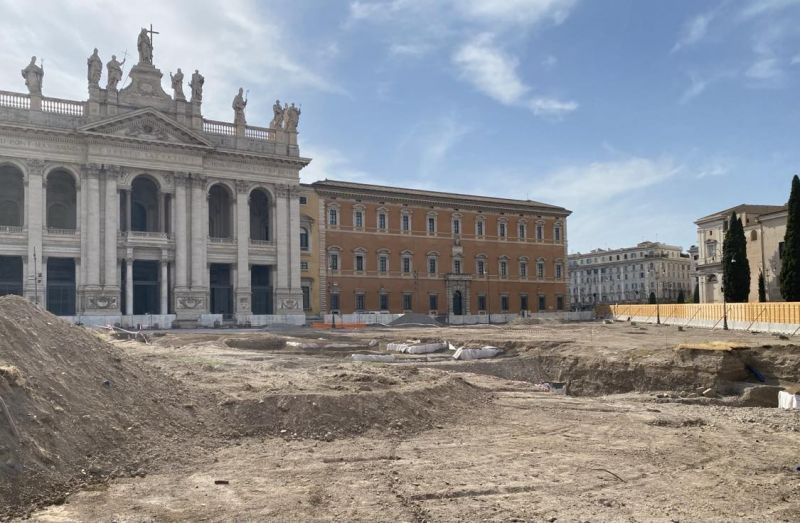
Rome enters final dash for Jubilee Year 2025.
Construction sites in Rome are operating around the clock as the Italian capital races to complete dozens of infrastructure projects ahead of the Vatican’s Jubilee Year 2025.
One of the biggest Jubilee projects underway in the city is the pedestrianisation of Piazza Pia, which will link Castel S. Angelo to Via della Conciliazione and St Peter’s Square.
The project, scheduled for completion at the start of December, will see traffic channelled underground to meet the existing Lungotevere in Sassia underpass, built for the Jubilee in 2000.
Works in Piazza Pia were recently interrupted temporarily by the discovery of the remains of a fullonica, the equivalent of an ancient Roman laundry, and a garden linked to Emperor Caligula.
The ruins were removed, and will eventually go on public display, with the city insisting that the discoveries would not slow down the scheduled opening date of the new underpass.
Other major projects include the restyling of Piazza Risorgimento near the Vatican, which will be partially pedestrianised, with an underground passage leading pilgrims towards St Peter’s.
The central Piazza della Repubblica and Piazza dei Cinquecento, in the area around Rome’s main train station Termini, are both being redeveloped ahead of 2025.
Construction work on the Ponte dell’Industria or Ponte di Ferro, the landmark bridge damaged by fire in 2021, is on track to open in December.
The works being carried out on the bridge have seen it strengthened signficantly, allowing it to support a weight of 26 tons compared to the previous 3.5 tons.
The bridge has also been widened by 11 metres to faciliate the passage of buses, together with a pedestrian walkway and a cycle path.
Another large-scale Jubilee project underway will see the city transform the sprawling site outside the Basilica di S. Giovanni in Laterano with new paving, lights and walk-in “splash” fountains.
In July archaeologists working in the piazza outside the landmark church unearthed a complex architectural structure including walls believed to have protected the Patriarchio, a monumental basilica envisaged by Emperor Constantine in the fourth century.
From a public transport perspective, the city has also been busy upgrading its Metro A subway line and tram network ahead of 2025.
The slew of Jubilee projects has caused major inconvience for the city’s motorists, a fact acknowledged by mayor Roberto Gualtieri who pledges that in the end “Rome will be more beautiful and efficient than before.”
The traffic situation is not helped by the drastically reduced mobility around the construction site for the Metro C subway station in Piazza Venezia, a project that began last year and will take about a decade to complete.
What is the Jubilee Year?
Vatican jubilees take place every 25 years and are designed as a “special year of grace, in which the Church offers the faithful the possibility of obtaining a plenary indulgence”, according to Vatican News.
There was an “extraordinary” Holy Year of Mercy in 2015, at the surprise behest of Pope Francis, while the last ordinary jubilee was in the millennium year of 2000 when around 25 million pilgrims and tourists thronged the capital.
The pope marks the event by opening the Holy Doors at St Peter’s as well as the other papal basilicas of S. Giovanni in Laterano, S. Paolo fuori le Mura and S. Maria Maggiore.
Traditionally the Jubilee begins just before Christmas and ends on the Epiphany of the following year, with the doors remaining open until the end of the holy year.
Cover image: Piazza di S. Giovanni in Laterano, August 2024. Photo Wanted in Rome.
(Except for the headline, this story has not been edited by PostX News and is published from a syndicated feed.)
